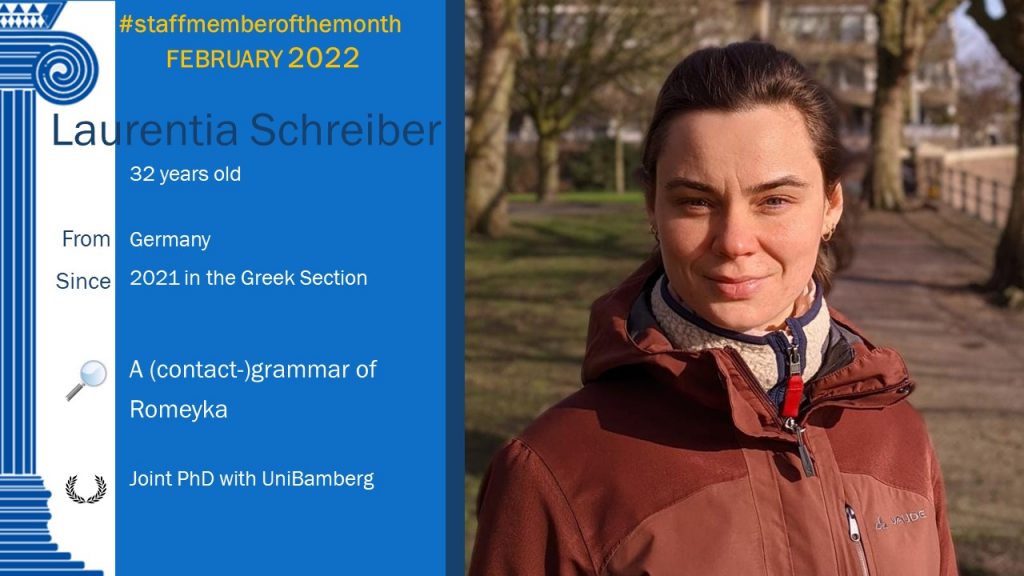February’s ‘staff member of the month’ is Laurentia Schreiber, who is doing a joint PhD on a fascinating endangered minority language in Turkey called Romeyka. What’s that all about? Serena Causo caught up with her to find out!
Hi Laurentia! You are our special ‘staff member of the month’ for February. You are with us since September 2021 in the context of a joint PhD between UniBamberg and UGent. That must be exciting! We are very curious to know what your project is about and why you chose Ghent University as joint institution for your PhD.
My PhD project aims to provide the first grammatical sketch of the endangered minority language Romeyka, a variety of Asia Minor Greek, which is still spoken by several thousand speakers in a mountainous area in Northeastern Turkey. Intense contact with Turkish and a currently ongoing language shift towards Turkish have led to interesting contact phenomena. At the same time, Romeyka features archaic traits from earlier stages of the Greek language. I am interested in exploring the evolution of synchronic grammatical features that can tell us how language changes under contact conditions and unbalanced bilingualism, which is a threat to many smaller languages of the world. Prof Mark Janse is renowned for his work on Asia Minor Greek, and Cappadocian in particular, so the desire to learn from him about the diachrony of regional varieties of Greek is what brought me to UGent.
I studied Dutch philology at Free University Berlin, and being fascinated with the particularities of Flemish dialects, I discovered my interest in linguistics. So Belgium, and Ghent in particular, mean a lot to me, not only professionally, but personally.
You are very close to the end of your PhD – no pressure! How do you feel? What are the moments you cherish most about this work and life experience?
To be honest, ‘being close to the end’ feels still like a relative statement. I realize that I have come a long way to get here but still there is so much to do. Unfortunately, I should say, I am somebody prone to thinking big, so I anticipate there will be some lessons for me ahead in how to get to the point with things. 🙂 The moments I cherish most during my PhD are probably those which took place in interaction with others: doing fieldwork with speakers in Turkey, traveling for conferences, teaching students, joint publications, … . – And finally, when I come to understand the internal structure of a complex spatial expression at the end of a day, that’s a nice feeling as well.
Romeyka features archaic traits from earlier stages of the Greek language. I am interested in exploring the evolution of synchronic grammatical features that can tell us how language changes under contact conditions and unbalanced bilingualism, which is a threat to many smaller languages of the world.
We know you are half way your experience in Gent. How has it been so far? Is your research benefitting from your stay?
Till now it has been a very enjoyable time here in Ghent – despite the limitations due to the pandemic: I enjoy the international, historical, cultural, and creative city and its people, and there is still enough time to focus on my work. In sum, I think the research stay took my dissertation to a different level with so many new insights. Now for the remaining time, I will need to wrap up and see how things can be integrated. However, the highest value of this stay is probably a personal one: I gained a lot of inspiration, but also focus, and new dynamics.
Now a warning: our favorite questions are always the most personal ones! It must be exciting and yet quite challenging to move to a new city – especially during this weird time. Have you fallen in love with the city yet? What are your favorite corners?
Actually, Ghent is not new to me as I was fortunate enough to spend my European voluntary service here back in 2009. As a consequence, I studied Dutch philology at Free University Berlin, and being fascinated with the particularities of Flemish dialects, I discovered my interest in linguistics. So Belgium, and Ghent in particular, mean a lot to me, not only professionally, but personally. I am very thankful for having been granted a chance to come back, tie onto earlier experiences, and make new ones. I still see some old friends, but can also continue my current hobbies like horse riding. And finally, there are so many beautiful places around for having a walk. For example, I enjoy a lot the open atmosphere of the harbour scenery of Portus Ganda right at the end of my street.
Thank you, Laurentia! We are so pleased to have you here and that you are enjoying your time in Gent. We wish you the best of luck with your work!
